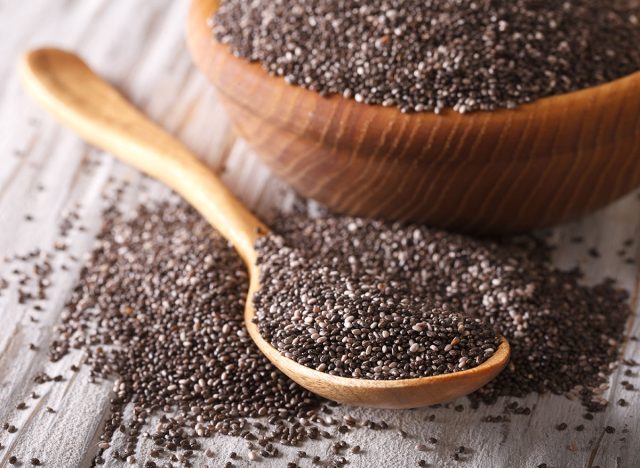Seeds have been around for millions of years, serving as the foundation of plant life. But it’s only recently that we’ve begun to truly appreciate their incredible nutritional punch. From fiber and healthy fats to vitamins and minerals, seeds are a concentrated source of nutrients that can do wonders for our health.
Let’s start with fiber. The majority of Americans are not eating enough of it. Experts recommend 25 grams for women and 38 grams for men, yet the average intake is just 17 grams. The good news is that seeds can be a great solution to closing this gap as they are fantastic fiber sources. Why does fiber matter? Eating enough of it can reduce your risk of colon cancer, enrich the gut microbiome, and support blood sugar balance.
Seeds also stand out for their omega-3 fatty acid content—a nutrient known for its anti-inflammatory and anti-anxiety properties. And if you’re looking to increase your protein intake, seeds can help with that too, particularly for vegans and vegetarians who need plant-based options. Plus, they’re allergy-friendly, with only sesame seeds falling within the top nine allergens.
Incorporating a variety of seeds into everyday dishes is an easy and impactful strategy for diversifying your nutrition. Sprinkle some crispy roasted pumpkin seeds on your salad, blend those delicate chia seeds into your morning smoothie, or mix flaxseed into your favorite bread recipe. A little goes a long way—just a tablespoon or two can turn an ordinary dish into a nutritional powerhouse.
While there are many different seeds out there, we take a deep dive into the top six healthiest seeds, each with its own unique nutrient profile and benefits. These tiny marvels prove that good things really do come in small packages.
Chia Seeds


Tiny but mighty, chia seeds are a powerhouse of nutrients. In just a 2-tablespoon serving, you will get 9 grams of fiber, 4 grams of protein, and a substantial amount of micronutrients including iron, magnesium, phosphorus, and zinc. A plant-based source of omega-3 fatty acids, chia seeds can support your heart health by decreasing total cholesterol, triglycerides, and LDL (bad) cholesterol while increasing HDL (good) cholesterol, according to a 2021 meta-analysis. Chia seeds have also been shown to lower blood pressure in people with type 2 diabetes.
To enjoy the nutritional benefits of chia seeds, add them to smoothies and overnight oats or make a chia seed pudding.
Flax Seeds


When you think of flax seeds, you might think of those bland, healthy cereals or the vegan flax “egg,” but did you know flax seeds boast a variety of health benefits? A 2-tablespoon serving contains 4 grams of fiber, 2.5 grams of protein, and 6 grams of healthy omega-3 fatty acids. Flax seeds can help decrease constipation, diversify the gut microbiome, lower systolic and diastolic blood pressure, and reduce spikes in blood sugars after a carbohydrate-heavy meal. Flax seeds also contain several important micronutrients, such as copper, manganese, and magnesium.
Get creative with flax seeds by using them as an ingredient in veggie burgers, meatballs, muffins, and smoothies.
Hemp Seeds


While hemp seeds come from the cannabis sativa plant, they don’t contain any CBD or THC. Rich in healthy fats, hemp seeds have an optimal ratio (3:1) of omega-6 to omega-3 fatty acids. Maintaining a low ratio of omega-6 to omega-3 is important to prevent the development of chronic diseases, as high amounts of omega-6 promote inflammation and cardiovascular disease. The traditional Western diet typically has a high ratio of omega-6 to omega-3 at 15:1. In contrast, a healthy ratio is considered to be 3:1 to 5:1. A 3-tablespoon serving contains 10 grams of complete protein, phosphorus, magnesium, thiamine, and 100% of your daily value of manganese.
For a variety of textures, try adding hemp seeds to your yogurt or smoothie bowls.
Quinoa


Commonly marketed as a whole grain, quinoa is actually a seed, believe it or not! Adding quinoa to your diet can support your heart health by lowering risk for cardiovascular disease factors including triglycerides, total cholesterol, LDL cholesterol, insulin blood levels, and waist circumference according to a 2020 meta-analysis. With 8 grams of protein per 1 cup cooked serving, quinoa is a great source of plant-based protein. Including quinoa in a vegan diet helps address the common concern of protein intake, which can be a challenge for some vegans. Additionally, it is safe to consume for those who have celiac disease.
Quinoa is a healthy carbohydrate source to add to a salad or bowl-you can even get creative by making quinoa-stuffed peppers or black bean burgers.
Sesame Seeds


A staple in Asian and Middle Eastern cuisines, sesame seeds come in three varieties: white, black, and golden brown. Sesame seeds are a good source of vitamins B1, B3, and B6. Vitamin B6 is essential for the metabolism of carbohydrates, fats, and proteins. Lignans, a component of sesame seeds, are known to have anti-inflammatory properties and anti-cancer effects.
Whether ground up in the form of tahini or sprinkled atop tofu, sesame seeds provide a subtle nutty flavor that will take your dish to the next level.
Pumpkin Seeds


Last but not least, pumpkin seeds! Whether you enjoy roasting your own pumpkin seeds fresh out of a pumpkin or buying them from the store, pumpkin seeds are highly nutritious. These seeds contain 8 grams of protein and 40% of the daily value of magnesium per 1-ounce serving. They’re also a good source of zinc, phosphorous, potassium, and selenium, antioxidants, and healthy polyunsaturated and monounsaturated fatty acids.
Try them atop salads and soups, in trail mix, or in homemade granola bars.

